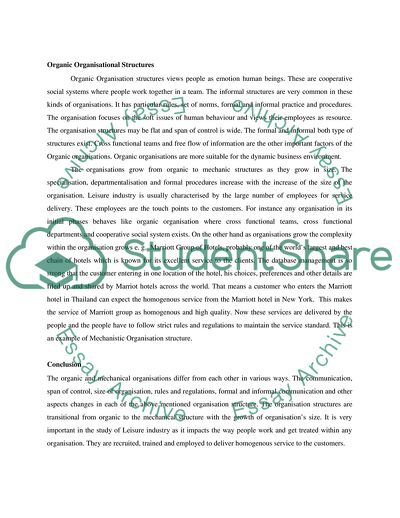
- Home
- Free Samples
- Premium Essays
- Editing Services
- Extra Tools
- Essay Writing Help
- About Us
- Studentshare
- Subjects
- Miscellaneous
- Leisure Industry Enterprise Management
Leisure Industry Enterprise Management - Essay Example

- Subject: Miscellaneous
- Type: Essay
- Level: Ph.D.
- Pages: 4 (1000 words)
- Downloads: 0
- Author: mariliehodkiewi
Extract of sample "Leisure Industry Enterprise Management"
Leisure service organisations fill this gap of the service sector. These organisations own, operate or engage in amusement; attractions; recreation; entertainment facilities, exhibitions, and products; eateries; lodging; and gaming activities.1 The deliverables in service organisations are intangible, it can not be stored, the production and delivery is simultaneous, it should be homogenous and the level of satisfaction depends on the person delivering the service and the person receiving the service.
Services offered by Leisure Industry ranges from amusement to gaming activities. Each organisation operating in service industry may be offering different services to different target customer groups. The deliverables and the manner to carry out business vary with the type of service and customer groups. The organisational structure will also vary with the size of business. Organisation structure can be of two types based on the structures: These are the organisations adopting mechanistic structure.
These organisations believe that organisations are rational entities. People working in such organisations are considered as economic beings. The focus is more scientific than human based. It is characterised by high specialisation, rigid departmentalisation, clear chain of command, narrow span of control and highly formal structures. These function best in stable business environment. Organic Organisation structures views people as emotion human beings. These are cooperative social systems where people work together in a team.
The informal structures are very common in these kinds of organisations. It has particular rules, set of norms, formal and informal practice and procedures. The organisation focuses on the soft issues of human behaviour and views their employees as resource. The organisation structures may be flat and span of control is wide. The formal and informal both type of structures exist. Cross functional teams and free flow
...Download file to see next pages Read MoreCHECK THESE SAMPLES OF Leisure Industry Enterprise Management
Marketing Management
Comparing Coca-Cola Enterprise and Pepsi Co. Financial Management
General Environmental Trends on the Industry - Gap
Social Enterprises Approach to Strategic Management
Enterprise Rent-a-car
Advantages and Disadvantages of Balance Score Card
Chandlers Theory of Large Scale Managerial Enterprise
The Usage of Social Media by Jamie Oliver Organisation

- TERMS & CONDITIONS
- PRIVACY POLICY
- COOKIES POLICY